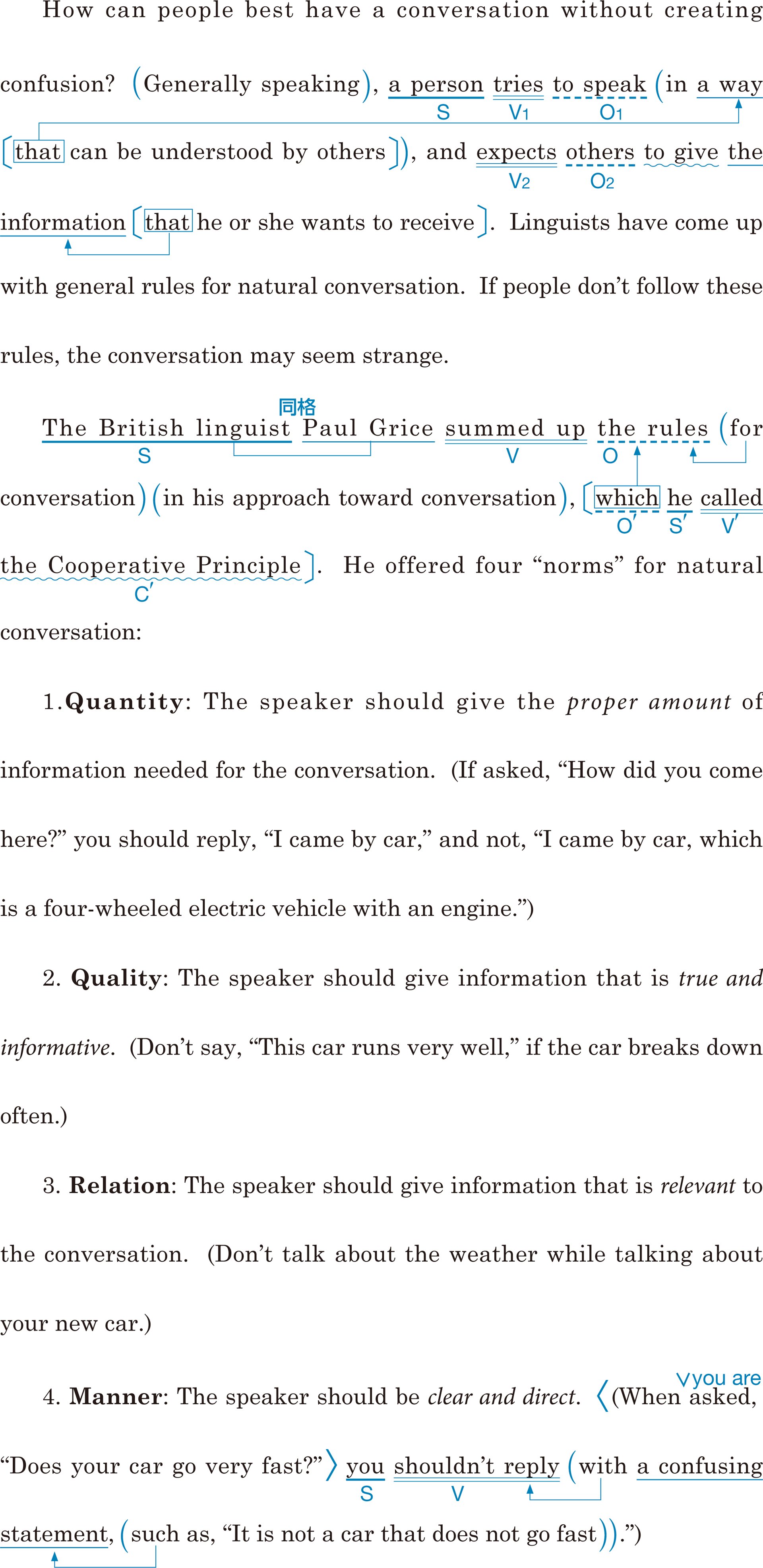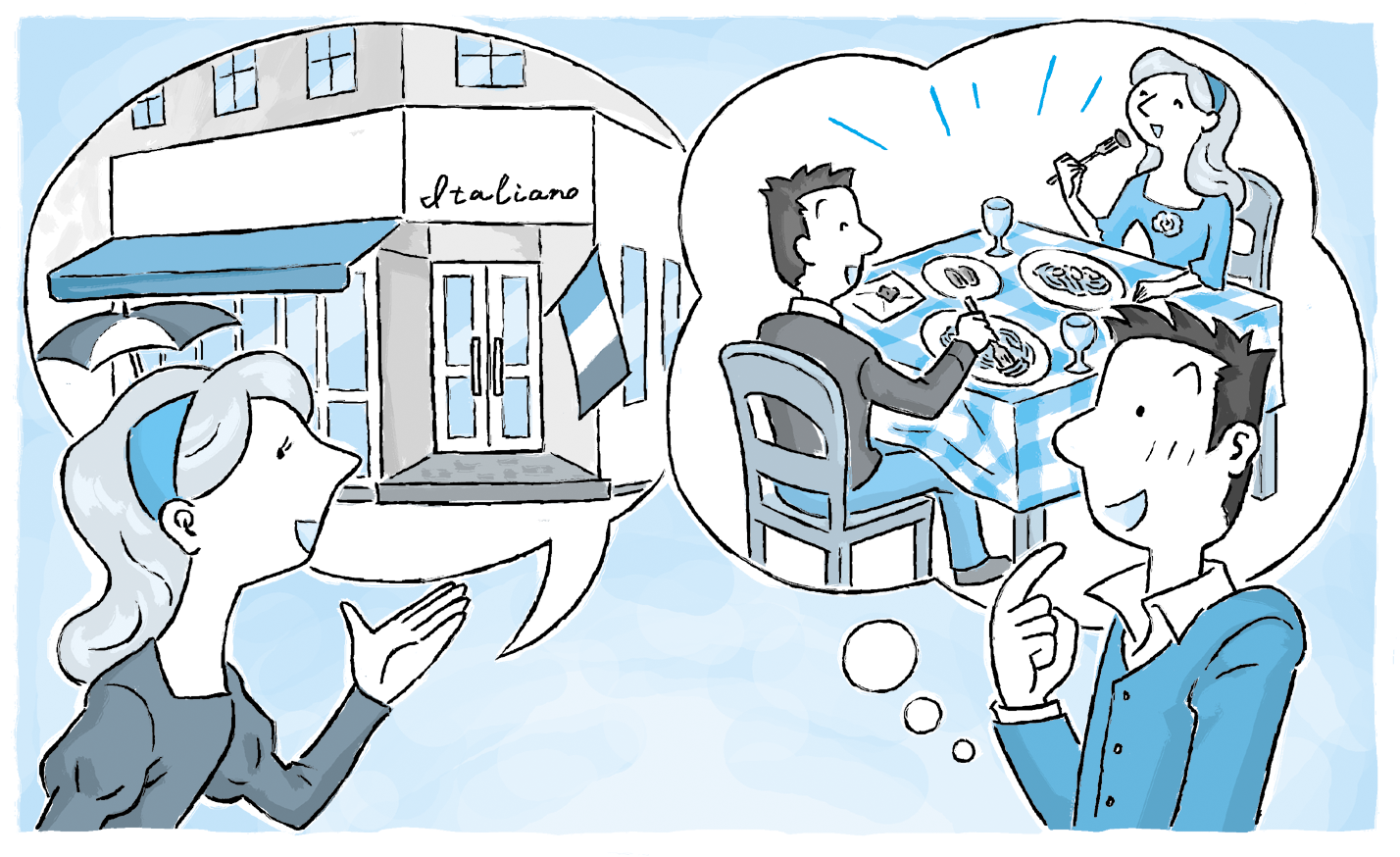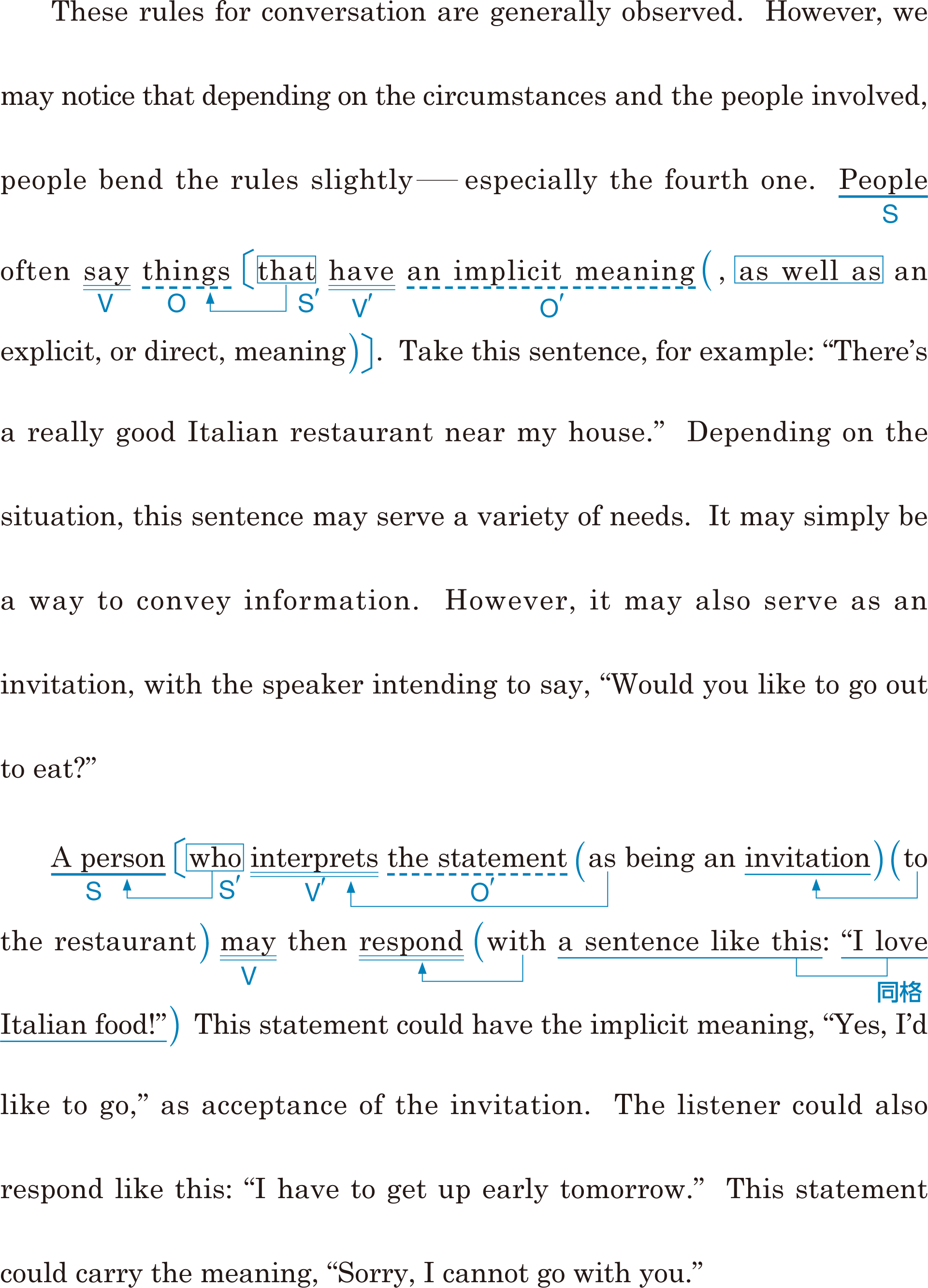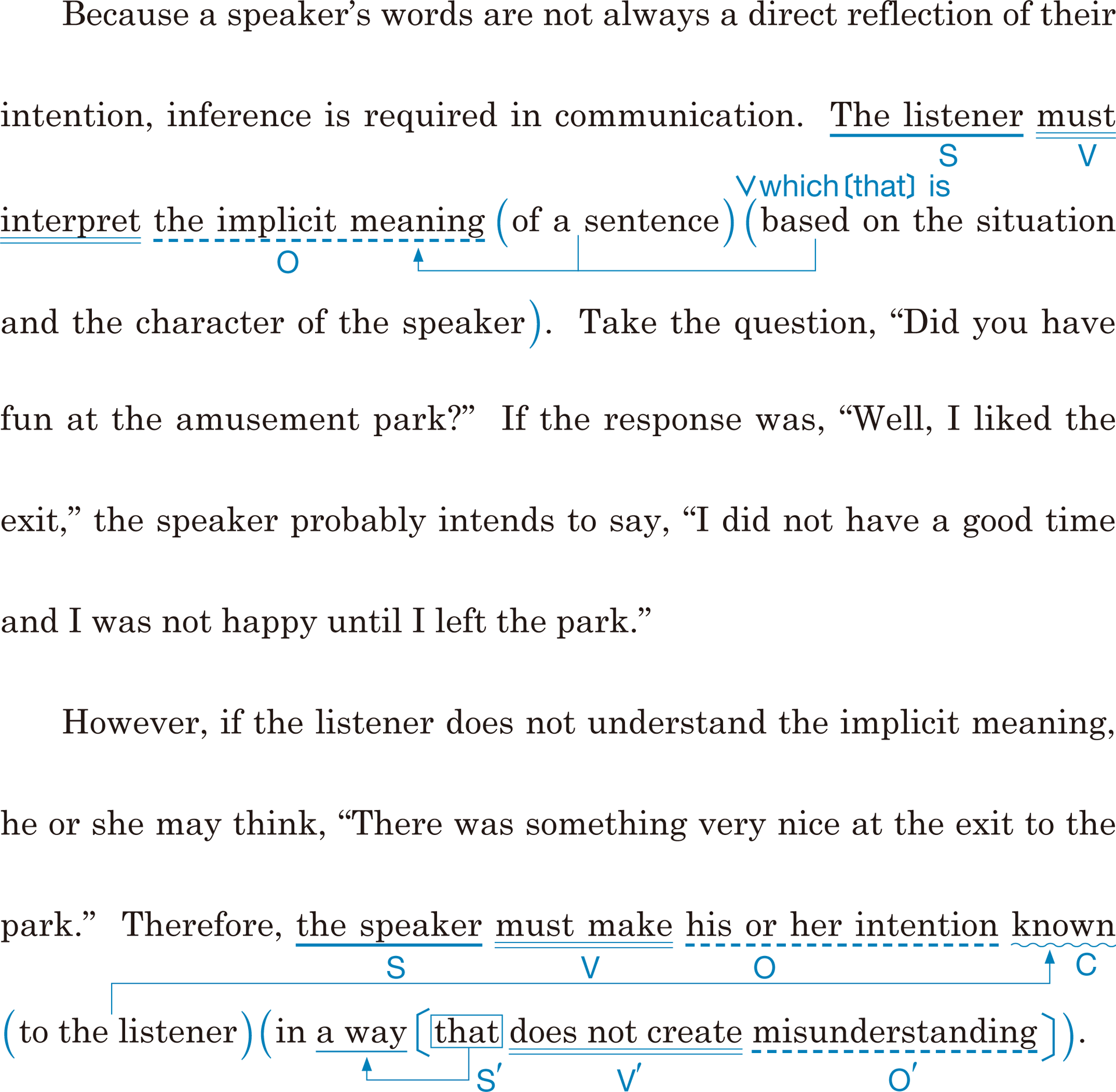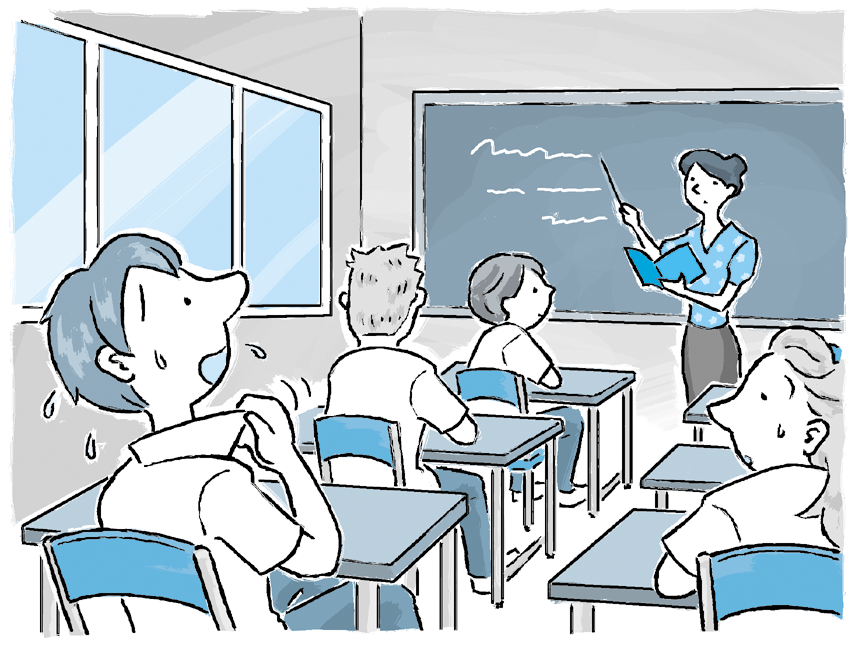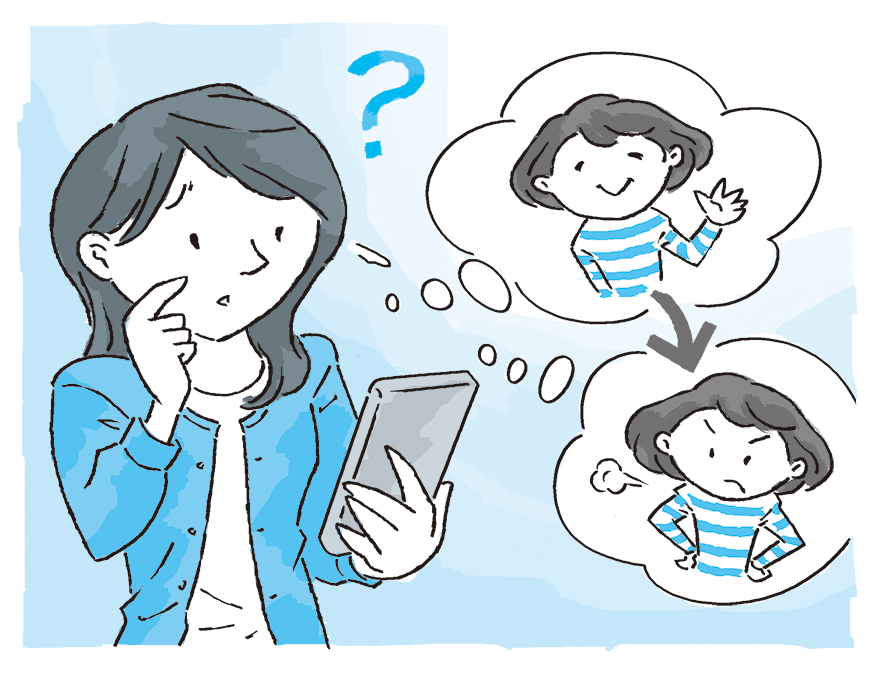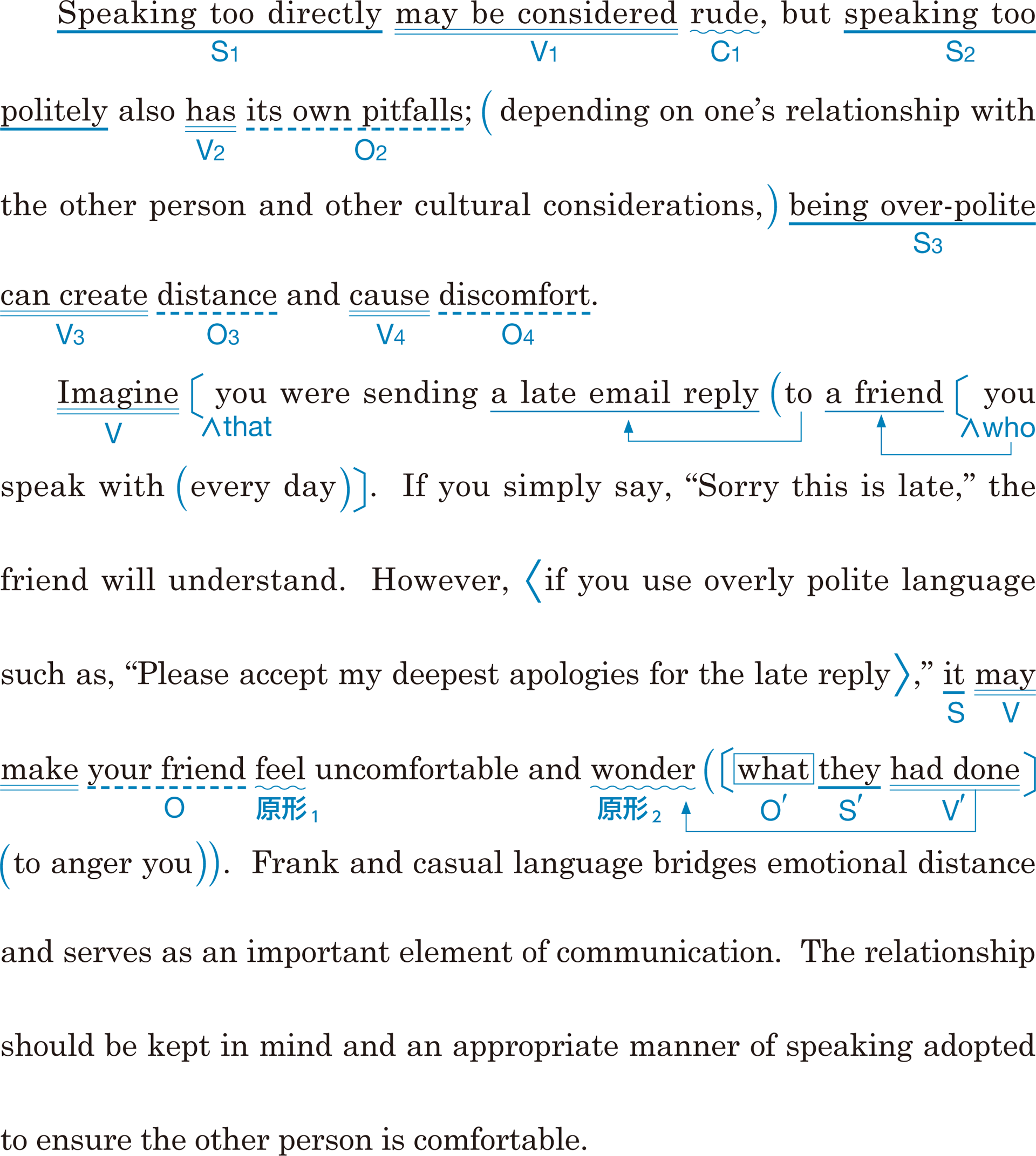READING
Section1
Q How can people talk to each other without creating confusion?

How can people best have a conversation without creating confusion? Generally speaking, a person tries to speak in a way that can be understood by others, and expects others to give the information that he or she wants to receive. Linguists have come up with general rules for natural conversation. If people don’t follow these rules, the conversation may seem strange.
The British linguist Paul Grice summed up the rules for conversation in his approach toward conversation, which he called the Cooperative Principle. He offered four “norms” for natural conversation:
1. Quantity: The speaker should give the proper amount of information needed for the conversation. (If asked, “How did you come here?” you should reply, “I came by car,” and not, “I came by car, which is a four-wheeled electric vehicle with an engine.”)
2. Quality: The speaker should give information that is true and informative. (Don’t say, “This car runs very well,” if the car breaks down often.)
3. Relation: The speaker should give information that is relevant to the conversation. (Don’t talk about the weather while talking about your new car.)
4. Manner: The speaker should be clear and direct. (When asked, “Does your car go very fast?” you shouldn’t reply with a confusing statement, such as, “It is not a car that does not go fast.”)
どうすれば人々は混乱を引き起こさずに最もうまく会話ができるでしょうか。一般的に言って,人は他の人に理解してもらえるように話そうとします。そして他の人には自分が受け取りたい情報を与えてくれるのを期待します。言語学者たちは自然な会話の一般規則を考え出しました。もし人々がこれらの規則に従わないと,会話は奇妙に思えるかもしれないのです。
イギリスの言語学者ポール・グライスは,会話に関する自身の取り組みの中で,会話のための規則をまとめました。彼はそれを「協調の原理」とよびました。彼は自然な会話のための 4 つの「規範」を提案しました。
1.量:話し手は会話に必要とされる適切な量の情報を与えなければなりません。(「どうやってここに来たのですか?」とたずねられたら,あなたが答えるべきなのは「私は自動車で来ました。」であって「私は自動車で来ました。それはエンジンを搭載した四輪の電動の乗り物です。」ではありません。)
2.質:話し手は真実かつ有益な情報を与えなければなりません。(もしもその自動車がしばしば故障するなら,「この自動車はとてもよく走る」と言ってはならないのです。)
3.関連性:話し手は会話に関連のある情報を与えなければなりません。(あなたの新しい自動車について話している時に,天気について話してはいけないのです。)
4.言い方:話し手は明確で直接的でなければなりません。(「あなたの自動車はとても速く走りますか?」とたずねられた時は,あなたは「それは速く走らない自動車ではありません。」といった混乱を招く発言で答えてはならないのです。)

- linguist(s)
- Paul Grice ポール・グライス
- sum(med)
- approach
- cooperative
- principle
- norm(s)
- quantity
- four-wheeled
- informative
- break down
- relevant
- manner
- confusing
- statement

Section 1 : True or False ?

(1) T / F
(2) T / F
(3) T / F
(4) T / F
(1) Linguists say there are rules that should be followed for natural conversation.[T]
(2) Paul Grice is a British linguist, who disagreed with the rules for natural conversation.[F]
(3) It is important for the speaker to give the listener as much information as possible.[F]
(4) The information that a speaker gives should be relevant to the conversation.[T]
Section2
Q What meaning does a statement sometimes have other than the direct meaning?

These rules for conversation are generally observed. However, we may notice that depending on the circumstances and the people involved, people bend the rules slightly —— especially the fourth one. People often say things that have an implicit meaning, as well as an explicit, or direct, meaning. Take this sentence, for example: “There’s a really good Italian restaurant near my house.” Depending on the situation, this sentence may serve a variety of needs. It may simply be a way to convey information. However, it may also serve as an invitation, with the speaker intending to say, “Would you like to go out to eat?”
A person who interprets the statement as being an invitation to the restaurant may then respond with a sentence like this: “I love Italian food!” This statement could have the implicit meaning, “Yes, I’d like to go,” as acceptance of the invitation. The listener could also respond like this: “I have to get up early tomorrow.” This statement could carry the meaning, “Sorry, I cannot go with you.”
これらの会話の規則は一般的に守られています。しかし,会話の状況や会話にかかわる人によっては,人は若干この規則を曲げることに私たちは気づくかもしれません。特に 4 つ目の規則にそのことが言えます。人々はよく,明示的な,あるいは直接的な意味だけでなく,暗示的な意味をもつことを言います。次の文を例に挙げてみましょう。「私の家の近くには本当においしいイタリア料理店があります。」状況によって,この文はさまざまな必要性を満たす可能性があります。これは単に情報を伝達する手段かもしれません。しかし,これは話し手が「食事に行きませんか?」と言おうとしている,招待としての役割も果たしているかもしれないのです。
この発言をレストランへの招待として解釈する人は,そのあとにこのような文で答えるかもしれません。「僕はイタリア料理が大好きなんです!」この発言は招待の承諾として,「ええ,僕は行きたいです」という暗示的な意味をもち得るのです。聞き手は次のように答えることもあり得ます。「僕は明日早く起きなければならないんです。」この発言は「ごめんなさい,僕はあなたと一緒に行けません。」という意味をもつ可能性があるのです。

- circumstance(s)
- bend
- implicit
- explicit
- convey
- interpret(s)
- acceptance

Section2 : True or False ?

(1) T / F
(2) T / F
(3) T / F
(1) The sentence “There's a really good Italian restaurant near my house” always means an invitation to dinner.[F]
(2) An answer such as “I love Italian food!” could mean the acceptance of an invitation in a certain situation.[T]
(3) When someone cannot accept an invitation to dinner, they must say so directly.[F]
Section3
Q What is required of the speaker and the listener?

Because a speaker’s words are not always a direct reflection of their intention, inference is required in communication. The listener must interpret the implicit meaning of a sentence based on the situation and the character of the speaker. Take the question, “Did you have fun at the amusement park?” If the response was, “Well, I liked the exit,” the speaker probably intends to say, “I did not have a good time and I was not happy until I left the park.”
However, if the listener does not understand the implicit meaning, he or she may think, “There was something very nice at the exit to the park.” Therefore, the speaker must make his or her intention known to the listener in a way that does not create misunderstanding.
話し手の言葉は必ずしも意図を直接反映しているとは限らないので,意思の疎通には推測が求められます。聞き手は状況や話し手の性格に基づいて,文の暗示的な意味を解釈しなければなりません。この質問を例に挙げましょう。「あなたは遊園地で楽しみましたか?」もしその答えが「そうだな,僕は出口が気に入ったよ。」だったならば,話し手はおそらく「僕は楽しくなかったし,遊園地を出て行くまでつまらなかった。」と言おうとしているのでしょう。
しかし,聞き手が暗示的な意味を理解しなかったら,聞き手は「遊園地の出口で何かとてもすてきなことがあった。」と考えるかもしれません。したがって話し手は,誤解を生じさせないやり方で,聞き手に自分の意図を理解させなければならないのです。

- reflection
- intention
- inference

Section3 : True or False ?

(1) T / F
(2) T / F
(1) The words and the intention of the speaker are always the same.[F]
(2) When a person doesn't enjoy an amusement park, he or she should say, “I liked the exit.”[F]
Section4
Q What is it important for speakers to do to make their communication go smoothly?

It is also important for speakers to select the proper words for the situation if they wish their communication to go smoothly. In our interactions with others, we try to minimize any unpleasantness that we may cause others to feel. A statement that is too forward or abrupt could give the listener an unfavorable impression.
Suppose it is very hot in the classroom and you want someone to open the window. What would you say? The simple statement, “Open the window,” may be correct English, but some may consider it rude because it is too direct. Therefore, a speaker may use gentler and more indirect ways of asking, such as, “Could you please open the window?” or “Would you mind opening the window?”
話し手は,もし意思の疎通を円滑に進ませたいと思うなら,状況に対して適切な言葉を選択することも大切です。私たちは他人との言葉のやり取りの中で,他人に感じさせてしまうかもしれない,いかなる不快さも最小限にしようとします。厚かましすぎる,あるいはぶっきらぼうすぎる発言は,聞き手に好ましくない印象を与えかねないのです。
教室がとても暑くて,あなたは誰かに窓を開けてほしいと思っているとしましょう。あなたは何と言うでしょうか?「窓を開けなさい。」という飾り気のない発言は正しい英語かもしれませんが,それは直接すぎるから失礼だと考える人もいるかもしれません。したがって,話し手は「窓を開けていただけますか?」あるいは「窓を開けていただいてもかまいませんか?」といった,もっと優しくもっと間接的な頼み方をすることがあるのです。

- select
- minimize
- unpleasantness
- abrupt
- unfavorable
- indirect

Section4 : True or False ?

(1) T / F
(2) T / F
(3) T / F
(1) When we talk to others, we often try not to cause them to feel unpleasantness.[T]
(2) If a statement is too abrupt, it can make the listener feel uncomfortable.[T]
(3) The simple statement, “Open the window,” is thought to be rude because it is incorrect English.[F]
Section5
Q What is the danger of speaking too politely?

Speaking too directly may be considered rude, but speaking too politely also has its own pitfalls; depending on one’s relationship with the other person and other cultural considerations, being over-polite can create distance and cause discomfort.
Imagine you were sending a late email reply to a friend you speak with every day. If you simply say, “Sorry this is late,” the friend will understand. However, if you use overly polite language such as, “Please accept my deepest apologies for the late reply,” it may make your friend feel uncomfortable and wonder what they had done to anger you. Frank and casual language bridges emotional distance and serves as an important element of communication. The relationship should be kept in mind and an appropriate manner of speaking adopted to ensure the other person is comfortable.
あまりにも直接的に話すのは失礼だと思われるかもしれませんが,あまりにも丁寧すぎても,それはそれで隠れた危険があります。相手との関係やほかの文化的な側面によっては,丁寧すぎることは距離を作り,不快感を引き起こす可能性があります。
たとえば,あなたが毎日話している友人に遅れてEメールの返信をしたとします。あなたが単に「ごめんね,遅くなって」と言うなら,友人はわかってくれるでしょう。しかし,「お返事が遅れてしまったことに対し深くお詫び申し上げます」のような,あまりにも丁寧な言葉を使用すると,あなたの友人は不快に感じるかもしれませんし,あなたを怒らせるような何をしてしまったのかと思うかもしれません。率直で打ち解けた話し方は,心の距離を埋め,コミュニケーションの大切な要素の役割をします。人間関係を念頭に置くべきで,相手が気分よくいられるように,適切な話し方を選ばなくてはなりません。

- directly
- politely
- pitfall(s)
- discomfort
- apology, apologies
- uncomfortable
- casual
- emotional
- element
- keep in mind

Section5 : True or False ?

(1) T / F
(2) T / F
(3) T / F
(1) Speaking too politely is generally better than speaking too directly.[F]
(2) In a friendly relationship, replying simply without overly polite language is appropriate.[T]
(3) Someone close to you may feel uncomfortable if you create a distance through language that is too polite.[T]
Section6
Q What should we be careful about when we talk with each other?

The examples above are just some of the ways in which people choose to express themselves in conversation. Without the proper selection of words, misunderstandings or discomfort can result. This is evident in the new ways in which we are communicating today. Artificial intelligence (AI) has made tremendous progress in recent years, and humans communicate with computers on a daily basis. However, unless a massive database is built containing every possible conversation pattern, it will be impossible for humans and AI to communicate smoothly and naturally. Through our experience in daily conversation, we have built this kind of database in our own minds. Therefore, whenever we talk with each other, we should be careful that what we say is not only correct, but also appropriate.
これまでの例は,人々が会話の中で自分の考えを表すことにするいくつかの方法に過ぎません。言葉を適切に選択しなければ,結果として誤解や不快感が生じることがあります。これは,今日私たちがコミュニケーションしている新しい方法の中で明らかになっています。近年,人工知能(AI)は驚異的な進歩を遂げており,人間は日々コンピューターと通信しています。しかし,可能なすべての会話パターンを含む膨大なデータベースが構築されていない限り,人間と AI が円滑かつ自然にコミュニケーションすることは不可能でしょう。毎日の会話での経験を通して,私たちはこの種のデータベースを私たちの頭の中に作り上げてきました。したがって,私たちがお互いに話すときはいつでも,私たちが言うことは正しいだけでなく,適切であることに注意する必要があります。

- selection
- evident
- AI
- tremendous
- basis
- massive
- database

Section6 : True or False ?

(1) T / F
(2) T / F
(1) Misunderstandings can occur if we don't choose the right words.[T]
(2) Computers are able to have natural conversations with humans.[F]


